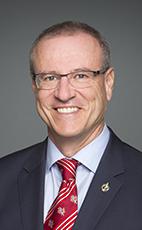Madam Speaker, I rise today to speak to Bill S-240, An Act to amend the Criminal Code and the Immigration and Refugee Protection Act (trafficking in human organs).
In 2007 at an airport in western Ukraine, I came across a gut-churning article on the front page of the local newspaper. The town's police officer had investigated the disappearance of orphans who, at age 17, were discharged from the care of the local orphanage. He had been worried that they were being trafficked into western Europe for sexual exploitation. What he discovered was much worse. These adolescents were sold to be trafficked for their organs, by the director of the orphanage.
In the following weeks, upon returning to Canada, a constituent made me aware of illegal clinics in India where poor farmers had their kidneys removed to pay off debts. Then the most barbaric example was brought to my attention. There were multi-million-dollar businesses run by the Chinese People's Liberation Army, which through its military hospitals had built an industrial-scale operation that removed, to order, body parts and organs of prisoners of conscience imprisoned in China's vast penal network.
This harrowing underground industry of trafficking in human organs and body parts, whether in the developing world or in totalitarian states, has commonalities. Those with power and wealth target and victimize the most vulnerable in their societies: orphans, destitute farmers, prisoners of conscience.
This depraved industry is a consequence of three global trends coinciding during the last decades: first, the development of medical technology allowing for the transplantation of virtually any body organ; second, an immense increase in global income disparities between the rich and powerful and the poor and vulnerable; and finally, easy and accessible transplantation tourism by wealthy westerners to clinics in the developing world.
I first addressed this modern-day horror in the House of Commons on February 2, 2008, when I introduced Bill C-500, an act to amend the Criminal Code with regard to trafficking and transplanting human organs and other body parts. Unfortunately, the legislation died on the Order Paper of the 39th Parliament, as did Bill C-381, which I introduced in the 40th Parliament, and Bill C-561, introduced by our colleague the Hon. Irwin Cotler in the 41st Parliament.
The horror of this industry hit home when, the very day after I first addressed this legislation in the House of Commons on February 3, 2008, the Toronto Star headlined an article “GTA home to 'Dr. Horror'”. Millionaire doctor Amit Kumar of Brampton was the mastermind behind an operation in India that implicated three hospitals, 10 pathology clinics and five diagnostic centres. This cabal had bought or forcibly removed and then trafficked to wealthy Indians and westerners the kidneys of approximately 500 destitute farmers and poor labourers in India.
However, the west is not just implicated in this industry by those among us willing to profit from the illegal removal of body organs, the “Dr. Horrors” among us. The profits feeding this evil are provided by those facing debilitating terminal illnesses, those among us made desperate by the severe lack of organ donations in Canada and other countries, those among us willing to not ask questions as to how and from where the human organs that extend their lives come from, and willing not to ask whether the donors were willing, willing not to ask whether donors' health and often lives were sacrificed and their organs stolen and exchanged for money.
This is why I supported what I consider to be a complementary sister motion, Motion No. 189 on organ and tissue donation. Organ donation can address this shortfall of organs for transplantation in Canada, and it is why legislation that addresses the trafficking and transplanting of organs must be passed.
My original draft legislation from 2008 has served as a template for similar legislation in Poland and Belgium. It is time for Canada to take action. Canadians must not be implicated in this depraved, evil industry that sees the wealthy and desperate in the west monetize, pay for the organs and body parts of the most vulnerable in the developing world: orphans, destitute farmers and prisoners of conscience.
Eleven years after I first tabled legislation to deal with the trafficking in human organs, I am heartened that legislation to combat this horror, to combat this modern form of cannibalism will finally be enacted by this 42nd Parliament.

